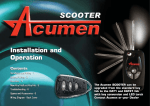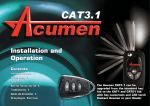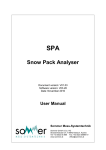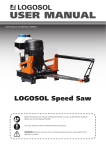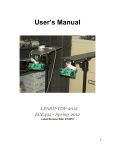Download CAT1 User Guide Sept 04.qxp
Transcript
User Guide IMPORTANT - Make sure you set up your Personal Identification Number (PIN) read Section 16 on page 8. IMPORTANT - Make sure you know where your System Fuse and Spare Fuse are located. Index System overview 2 The remote transmitter 3 Customising the system 4 Section 1. Full Mode Section 2. Convenience Mode Section 3. Service Mode Section 4. Diagnostic Mode Section 5. Different siren tones Section 6. Customising Audible warning of Arm/Disarm Section 7. Hazard (4-way flasher) Mode Section 8. Customising the nudge sensor and movement sensitivity Section 9. Indicator warning Section 10. Motorcycle Over-voltage Section 11. Remote Transmitter battery low warning. Section 12. Torch feature Section 13. Key Conversion Section 14. Trigger warning Section 15. Sleep Mode Section 16. PIN Override Troubleshooting 10 Maintenance 11 1 System Overview The CAT1 also; 1. Has a ‘fully armed’ mode (see section 1) The Acumen CAT1 consists of the following main components; 2. Has a ‘Convenience’ mode (see section 2) • Installed CAT1 main unit 4. Has a diagnostic mode (see section 4) • 2 x remote transmitters 5. Has 14 different siren tones (see section 5) • Installed protecting switch • Installed system fuse and spare fuse 6. Can have the audible warning of arming/disarming removed (see section 6) • LED system indicator Be sure that you know: 1. Where the system fuse is, and where the spare fuse is located. If the fuse fails, the system will not allow the motorcycle to start. 2. Set your PIN override. This will enable you to disarm the system and still start your motorcycle if the remote transmitter is lost or does not function (see Section 16). The CAT1 will monitor; 1. The motorcycle battery and associated motorcycle wiring. If the battery is disconnected or the ignition is switched on the alarm will trigger. The CAT1 also monitors the state of the motorcycle battery for ‘sleep’ purposes. 2. The ignition circuit. If the ignition is switched on while the CAT1 is protecting the system it will trigger an alarm. Also, the CAT1 Uses the ignition to enter diagnostic and service mode. 3. Has a service/valet mode (see section 3) 7. Can activate all four indicators in a Hazard warning mode (see section 7) 8. Can be programmed to arm in ‘Full’ mode (without movement/nudge sensing) (see section 1) 9. Can be programmed to have the nudge sensing removed (see section 8) 10. Can be programmed to alter the sensitivity of the movement sensor (see section 8) 11. Can be programmed to act as an indicator or warning system when riding the motorcycle (see section 9) 12. Will tell you if it senses excess voltage when the engine is running (see section 10) 13. Will tell you if the remote transmitter batteries are becoming discharged (see section 11) 14. Has a useful torch in the remote transmitter (see section 12) 3. Nudge and movement, with a liquid filled, state-of-the-art sensor. 15. Has an ignition key conversion feature in the remote transmitter (see section 13) 4. An anti-tamper switch will cause the alarm to trigger if an attempt is made to gain unauthorised access to the CAT1 system. 16. Will tell you if the alarm has triggered in your absence (see section 14) 17. Has a user-selectable PIN override number (see section 16) 2 The Remote Transmitter This button will; This button will; • Arm & disarm the system, • • Allow you to enter Diagnostic and Service Modes. • • This button will; • Ignition key Deactivate/activate tilt The system is supplied with 2 transmitter/Ignition keys, if a new transmitter is supplied, a new key can be attached as shown in the and vibration, diagram opposite. Select siren tone, Select number of digits in PIN Allow the ignition key to swivel out When all three buttons are pressed at once and held for 5 seconds With ignition off - Silent arm/disarm is toggled (14 flashes on/7 off) With system armed or disarmed - on/off With ignition on, system disarmed - Nudge sensor toggled on/off (6 flashes on/3 off) With ignition off, system in service mode - Indicators on warning function is toggled on/off (5 flashes on/10 off) Undo these screws (x3) to remove cover and replace batteries Standard Settings of the system This button will; • Activate the torch These screws (x2) attach the ignition key to the transmitter When the system arms, immobilisation and hot wire (ignition circuit becomes live) functions only will be enabled. The system will arm automatically 50 seconds after the ignition is switched off. (this time cannot be altered) You can manually arm the system by pressing the lock button. (You will get 2 beeps and 2 flashes of the indicators) (see section 6) To disarm the system, press the lock button. (You will get 1 beep and 1 flash of the indicators) (see section 6) The system will arm with an audible warning of arming. Replacement battery type CR2016 3 Customising the system Section 1. Full Mode To passively arm the system automatically with all functions enabled simply fix the Yellow wire from the alarm to a suitable earth (ground) point. A. If the movement sensor is active, the system LED will flash once every second B. If the system is in Convenience Mode (see section 2), the LED will flash once every two seconds. C. If you manually arm the CAT1 system within the 50 seconds auto arm time, by pressing the ‘key’ button, the system will arm with the movement sensing active. Section 2. Convenience Mode During day to day use of the motorcycle there are times when full passive arming with movement sensing can be inconvenient e.g. filling with fuel or parking momentarily while opening a garage door. Arming without movement sensing is called Convenience Mode and can be achieved automatically when the ignition is switched off or by using the key fob transmitter depending on how the system has been installed. A. Where the system is installed to arm all sensors automatically when the ignition is switched off, (i.e. yellow wire permanently grounded) convenience mode can be selected by pressing ‘P’ on the key fob transmitter after the system arms. (Passive arming takes place 50 seconds after switching off the ignition. B. To avoid waiting for the system to arm automatically press the ‘key’ button once to manually arm the system before the 50 seconds elapses and then the ‘P’ button to enter Convenience Mode.) Section 3. Service Mode There may be times when you really don’t want the system on the motorcycle. Such as when cleaning, or performing service work. The CAT1 has a service mode which effectively makes the CAT1 system transparent. To enter Service Mode, disarm the system, switch on the motorcycle ignition. With the ignition on press and hold the lock button until the system gives a ‘beep’ (two to three seconds). This denotes the system has entered service mode. In Service Mode, the alarm will beep once every 60 seconds. (If you get more than one beep see section 4), and the LED remain on and will not flash. If the alarm is left in Service Mode for over 24 hours, the beep will be switched off. Remember in Service Mode your motorcycle is totally unprotected - the LED will serve as a reminder! If you are storing your motorcycle, and need to move the motorcycle now and then, we suggest you arm the system and place it into Full Mode. 4 Customising the system Section 4. Diagnostic Mode Section 5. Different siren tones Diagnostic Mode will let the system tell you why it has been reacting. If you experience alarms, it helps to know why. The CAT1 system will tell you. Entering Diagnostic Mode is the same as entering Service Mode. Having an individual siren tone helps you, the rider, to be more aware if it’s your alarm that is making that noise! The CAT1 has 14 different siren tones, and you can select which one you would like. Upon entering this mode, the system will give you a series of beeps. Compare the number of beeps with the chart below, and that is the reason the alarm had it’s last trigger. In diagnostic mode, the system will give these series of beeps once every 15 seconds for 2 minutes, and then automatically revert to service mode. 2 beeps The system cannot ‘see’ a motorcycle battery. Check the alarm fuse, main power connection or earth connections. 3 beeps The system has detected the ‘ignition on’ signal which may a simple mistake or may be a forced ignition lock. 4 beeps The system has detected movement/nudge. It may be a windy day! Maybe you may not want to park your motorcycle their tomorrow. 5 beeps The anti-tamper switch has changed it’s state. Some tones will penetrate some materials, such as seat foam, easier than others. Experiment with what suits you. In the ‘selection’ time the siren is subdued so you don’t upset your neighbours; too much anyway. Use discretion at what time of day you do this. To select your own tone; A. Place the system in Service mode (see section 3) and leave ignition on B. Hold the ‘P’ button until a siren tone is heard C. Press the ‘P’ button - each press will result in a different tone. D. Press ‘key’ button to confirm selection. E. You are then free to exit service mode. Section 6. Customising Audible warning of Arm/Disarm You may not want the audible beep to confirm arming and dis-arming. This feature can be toggled in and out as desired. With the ignition off, system armed or disarmed, press all three buttons of the remote transmitter together and hold for approx 5 seconds until indicators flash quickly. 7 flashes indicates the system is in silent mode 14 flashes indicates the system is in audible mode. 5 Customising the system Section 7. Hazard (4-way flasher) Mode Section 9. Indicator warning With the motorcycle ignition off, system armed or disarmed, Hold the ‘key’ and ‘P’ button down simultaneously for approx 3 secs. The Acumen CAT1 system can be set as a turn signal reminder. It’s all too easy to leave indicators on - with possible disastrous consequences. The system is set to have this function enabled when it leaves our factory. If the indicators flash five times and then go out, then either; A. The motorcycle ignition is on, or B. The motorcycle battery is of insufficient voltage The indicator warning will ignore the first 20 flashes of your indicators, then start to beep, quietly. It will get louder and louder to a maximum loudness at 40 flashes. WARNING To remove/add this function; The system monitors the motorcycle battery when in Hazard mode. If the motorcycle battery voltage begins to decline to a point where your motorcycle may no longer start, the unit will switch the hazards off automatically. Place the system in service mode (see section 3). With the motorcycle ignition off press all three buttons on the remote transmitter for approx 5 seconds until the indicators flash rapidly. 10 flashes indicate the feature has been turned OFF 5 flashes indicates the feature has been turned ON. Section 8. Customising the nudge sensor and movement sensitivity A. In high winds, the nudge sensor may activate the system. It will determine the rocking is an attempt to remove items such as fairing panels, seat or luggage. Too many ‘nudges’ in a set period of time will result in a full reaction. You can remove this function, and add it back when it suits you. With the alarm disarmed, and the ignition switched on, press the ‘P’ button. This will toggle the pre-alert function off and on. (3 flashes - off and 6 flashes - on) B. If the movement sensor Is insensitive, ground the BROWN wire which comes from the alarm. This will increase the sensitivity. Section 10. Motorcycle Over-voltage If your motorcycle has problems with its own electrical system, you may not be aware of this until it’s too late. Overcharging of the motorcycle battery will result in greatly reduced battery life and possible breakdown. The Acumen CAT1 system monitors your motorcycle electrical system for over-voltage while the motorcycle is being used (set at 16V). If the system has been subjected to overvoltage, it will beep 3 times as soon as the ignition is switched off. If this happens several times, we recommend you have your motorcycle examined by an authorised dealer. 6 Customising the system Section 11. Remote Transmitter battery low warning. Section 13. Key Conversion Whenever the remote transmitter is used, the alarm monitors the state of the transmitter’s batteries. When the batteries start to become discharged, the CAT1 system will tell you with a burst of rapid beeps, 2 series of beeps on arming, 1 series of beeps on disarming. On registering the alarm as first or subsequent owner you will receive two key blanks. These will be suitable for your motorcycle which can be cut locally to match your original key. When this happens you still have plenty of time to get those batteries replaced. We recommend you don’t use the torch function though. (see section 12) Section 12. Torch feature The remote transmitter has a torch built into it. This is extremely useful to help you find the ignition lock on those dark wintry mornings and evenings. Press the ‘torch’ button to activate the torch. Excessive use of the torch will discharge the transmitter batteries. However, this should not cause a problem because A) There is an automatic shut-off of the torch set at 20 seconds. If you need the torch function for longer than this, release the button and start again. B) Even if the batteries become so discharged they can no longer work the torch, the radio (arm/disarm) part of the transmitter continues to function. C) The CAT1 system will tell you if the transmitter batteries are becoming discharged (section 11) D) If all else fails you can still use the PIN override to start your motorcycle. Section 14. Trigger warning If the alarm has triggered while it has been protecting your motorcycle, it will tell when you disarm the system. The system will give one long beep instead of one quick beep. You can then enter diagnostic mode (Section 4) and the alarm will tell you why it has been triggered. Section 15. Sleep Mode The Acumen CAT1 incorporates a sleep mode to protect the motorcycle battery. If you use an intelligent float charger, such as the Acumax 900, the unit will not go into sleep. If the unit is in sleep, and you connect a charger, the unit will come out of sleep mode. Sleep mode is determined by a combination of battery state and time. If the unit is in sleep (determined by very slow flash rate of the system LED) you can disarm by; Holding down the ‘key’ button and then switch on the motorcycle ignition. 7 Customising the system Section 16. PIN Override TO ENTER THE INITIAL PIN If you cannot disarm the system from the remote transmitter - see troubleshooting, - you will be able to disarm the system by using the Personal Identification Number (PIN). Each step in this process will be confirmed by beeps or tones: Ignition on, count 1 beep, ignition off 1. Disarm the system Ignition on, count 2 beeps, ignition off 2. Remove system fuse (1 beep will confirm this) Ignition on, count 3 beeps, ignition off The CAT1 system leaves the factory with no PIN override in its memory. We feel it is easier for you, the rider, to enter a number which means something to you and can easily be remembered. You should never need to use the PIN override, but if you do have to use it then this system just might make life a bit easier! To enter a new PIN you will need access to the system fuse (details of where the fuse is positioned should be on the Certificate of Installation. Acumen will not know where the fuse is!). and you will have to be able to enter service mode (see section 3) The CAT1 has the ability to accept different levels of security of the PIN - 4, 5 or 6 digits. 4 Digits will give 6561 combinations 3. Switch motorcycle ignition on. (1 beep) You can now enter the pin of your choice; say 4 digits - 1234 Ignition on, count 4 beeps, ignition off 4. Enter service mode (1 beep - 2 to 3 seconds) Press the ‘P’ button on the transmitter. 5. Press ‘key’ and ‘P’ buttons together on the transmitter (1 beep) You will now get one long tone, and you will need to confirm the PIN 6. Replace system fuse (1 beep) Ignition on, count 1 beep, ignition off 7. Switch ignition off (1 beep ) 8. Press ‘key’ and ‘P’ buttons together on the transmitter (2 beeps) Ignition on, count 2 beeps, ignition off Ignition on, count 3 beeps, ignition off Ignition on, count 4 beeps, ignition off IF YOU GET IT WRONG Should you get it wrong or distracted at any point in this process, and you want to start the process again, simply disarm the alarm with the transmitter. • If the ignition is left OFF for more than 2 minutes and no action is taken, the system will revert to Service Mode. • If the ignition is left ON for more than 10 seconds and no action is taken, the system will revert to Service Mode. 5 Digits will give 59049 combinations, and 6 Digits will give 531441 combinations. You will get 2 long tones to confirm the PIN has been entered successfully. (3 short tones means the first and second entry of the PIN did not match - try again!) The above example was for a PIN of 4 digits. If you want 5 or 6 digits, then you need to choose 5 or 6 numbers before you press the ‘P’ button on the transmitter, and again when you confirm the PIN. 8 Customising the system ENTERING A NEW PIN WHEN A PIN IS ALREADY KNOWN. From time- time you may wish to change the PIN that is in the system. 1. Disarm the system 2. Remove system fuse (1 beep will confirm this) Now enter the new pin (say, 6789) by Ignition on, count 6 beeps, ignition off Ignition on, count 7 beeps, ignition off Ignition on, count 8 beeps, ignition off Ignition on, count 9 beeps, ignition off Press the ‘P’ button on the transmitter. 3. Switch motorcycle ignition on. (1 beep) 4. Enter service mode (1 beep ) 5. Press ‘key’ and ‘P’ buttons together on the transmitter (1 beep) You will now get one long tone, and you will need to confirm the new PIN 6. Replace system fuse (1 beep) Ignition on, count 6 beeps, ignition off 7. Switch ignition off (1 beep) Ignition on, count 7 beeps, ignition off 8. Press ‘key’ and ‘P’ buttons together on the transmitter (1 beep) Ignition on, count 8 beeps, ignition off Ignition on, count 9 beeps, ignition off Ignition on, count 2 beeps, ignition off Ignition on, count 3 beeps, ignition off Ignition on, count 4 beeps, ignition off If the system is armed and you cannot disarm it from the transmitter, disarm using the PIN override (in this example the PIN is set to 1234) Switch on the motorcycle ignition and leave on the alarm will react... Let the system react for 30 seconds (until it stops). The LED will illuminate for 5 secs and during this time switch the ignition OFF DURING THIS 5 SECOND PERIOD Switch ignition ON - count 1 beep - ignition OFF Switch ignition ON - count 2 beeps - ignition OFF Switch ignition ON - count 3 beeps - ignition OFF Switch ignition ON - count 4 beeps - ignition OFF Enter your known pin; say 4 digits of 1234 Ignition on, count 1 beep, ignition off DISARMING THE SYSTEM USING THE PIN OVERRIDE The above example was for a PIN of 4 digits. If you want 5 or 6 digits, then you need to choose 5 or 6 numbers before you press the ‘P’ button on the transmitter, and again when you confirm the PIN. The system will now disarm - 1 beep and 1 flash of the indicators, you now have 50 seconds to start the motorcycle or the CAT1will arm again. 9 Troubleshooting The Acumen CAT1 is manufactured using automotive specification parts, including a waterproof connector, and is fully encapsulated to provide protection against water and vibration. The system relies on various signals to make it function correctly and any one of these signals may cause false reactions. False alarms; Enter diagnostic mode to see why the alarm has triggered. 2 beeps. Blown fuse - Replace. If it blows again contact the installing dealer. 3 beeps. The unit has detected an ‘hotwire’ signal. 4 beeps. The movement or nudge sensor has reacted. Enter Convenience Mode (Section 2) to remove this function until the problem is sorted. System cannot be armed or disarmed by the remote transmitter 1. Check the ignition switch is in the off position 2. Check the system fuse 3. Check you are within normal operating range of the motorcycle (10 metres max) 4. Check the condition of the transmitter battery 5. The transmitter can be affected by other radio sources. This problem can usually be overcome by placing the transmitter as close as possible to the alarm system. Alternatively, you can move the motorcycle a distance which will reduce the affect of the interference. In this event you can disarm the system by using the PIN. 5 beeps. Anti tamper switch - ensure it is mounted correctly. Starter Motor Fails to function Don’t forget! The motorcycle might have a problem! 1. Ensure the ‘kill’ switch is on, the transmission is in neutral and/or the clutch is disengaged. 2. Check the motorcycle battery is in good condition 3. Check the CAT1 system fuse. If the system cannot ‘see’ the motorcycle battery it will not let the motorcycle start. 4. Check the CAT1 system can obtain service mode (section 3) If the CAT1 cannot obtain Service mode, it means the system cannot ‘see’ the motorcycle ignition. In this event the system will not let the motorcycle start. Bear in mind the problem may be with the motorcycle - check the motorcycle fuses. 10 Maintenance Transmitter Spares & Accessories The transmitter contains delicate electronic circuitry. Do not subject to excessive shock, heat, or immersion in water. Acumen can supply a range of spares & accessories to enhance the features of the CAT1 system, Replace the batteries when you here a burst of rapid beeps from the CAT1 system upon use of the transmitter. The transmitter uses 2 x CR2016 batteries. 1. Spare and replacement remote transmitters and batteries New Transmitters 3. Acumax 900 Intelligent ‘float’ battery charger New transmitters are available directly from Acumen Electronics Ltd or from your installer. The system can only recognise two remotes at any one time. 4. Extra, external sirens. (If your CAT1 system is ‘buried’ in the motorcycle, the audible warning may not be as loud as you would like. This extra siren will allow to position it where the sound can get out.) Motorcycle Battery The CAT1 system incorporates a sleep mode (see section 15) to protect the motorcycle battery from deep discharge. Should you wish to use an intelligent float charger, we recommend the use of the Acumax 900 charger, available from Acumen Electronics Ltd. 2. Different coloured System LED’s to match your motorcycle (Green, Red, White, Blue, Yellow) 5. Pager. If your alarm is triggered while you are out of earshot, the pager will let you know. It will tell you if you are in range, and has three trigger circuits. 6. Additional magnet sensors (such as seat, or link to your garage door). General Security Precautions. Warranty terms and Conditions While the Acumen CAT1 provides state of the art electronic security and protection, it will not, by itself, ensure your motorcycle will not be stolen. We recommend you undertake basic security precautions such as; Full details are given in the Terms and Conditions document. Parking in a locked garage if possible, www.acumen-electronics.co.uk Parking in well lit areas if a garage is not applicable, Using a bike cover where appropriate, Using a chain or shackle and ground anchor. 11














